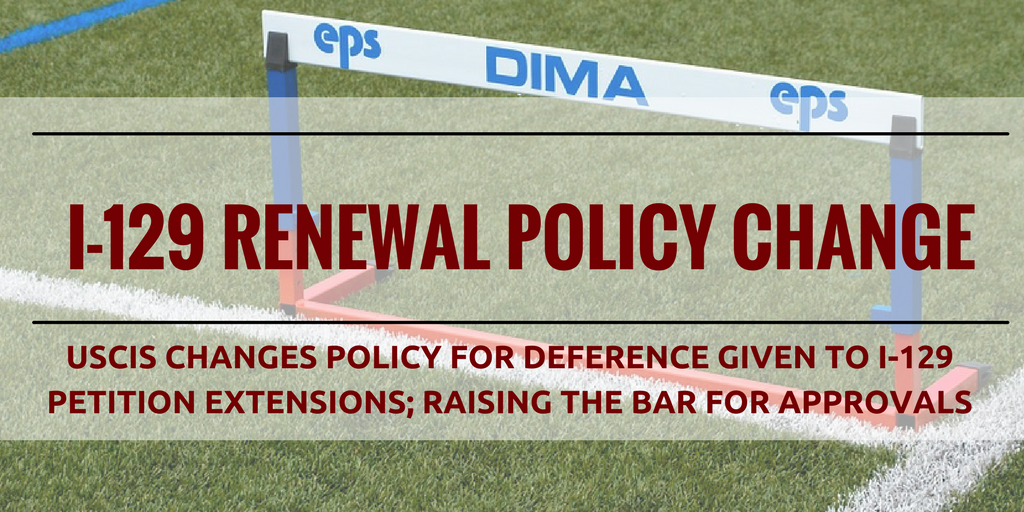USCIS Changes Deference Policy for I-129 Extensions: Raises the Bar for Approvals
In an October 23, 2017 Memorandum, U.S. Citizenship and Immigration Service (“USCIS”) has issued a Policy Memorandum which eliminates the current practice of giving deference to prior approvals when adjudicating Form I-129 petition renewals where the petitioner, the beneficiary and the material facts of the petition remain unchanged. This affects all I-129 petitions extensions, including H-1B, L-1, O-1 and more.
The Policy Memorandum
The Policy Memorandum number PM-602-0151, dated as of October 23, 2017, specifically rescinds prior guidance which instructed USCIS adjudicators to give deference to prior determination of eligibility. Specifically, the April 23, 2004 memorandum named “The Significance of a Prior CIS
Approval of a Nonimmigrant Petition in the Context of a Subsequent Determination Regarding
Eligibility for Extension of Petition Validity” and the August 17, 2015 memorandum named “L-1B Adjudications Policy” (directing adjudicators to give deference to prior L-1B petition approvals when reviewing extension requests) are being rescinded.
The rationale provided by USCIS in rescinding the deference is,
In adjudicating petitions for immigration benefits, including nonimmigrant petition extensions, adjudicators must, in all cases, thoroughly review the petition and supporting evidence to determine eligibility for the benefit sought. The burden of proof in establishing eligibility is, at all times, on the petitioner. The fundamental issue with the April 23, 2004 memorandum is that it appeared to place the burden on USCIS to obtain and review a separate record of proceeding to assess whether the underlying facts in the current proceeding have, in fact, remained the same. Not only did this improperly shift the burden of proof to the agency contrary to INA § 291, but it was also impractical and costly to properly implement, especially when adjudicating premium processing requests.
Which Petitions are Affected?
All petitions seeking an extension of nonimmigrant status appear to be affected. This includes H-1B, L-1B, L-1A, O-1, E-3, among other types of nonimmigrant status. Basically, almost all types of cases which utilize Form I-129 are affected by the revised policy.
What Does the New Policy Mean for Extensions?
The practical significance of the new policy is that a large number of I-129 petition extensions will face increased scrutiny during the adjudication process. Under the prior guidance, USCIS adjudicators were directed to give significant deference to the prior approval and where the material facts of the petition remain unchanged, this used to mean, in theory, lower burden of proof to the petitioner.
Under the new guidance, petitioners should be prepared to demonstrate and document all eligibility factors, as if this is a first-time petition filing. Our office’s practice has been to treat each Form I-129 petition (and extensions, specifically) as its own standalone petition requiring a full and complete set of documents, regardless of prior approval history, and USCIS seems to be bringing this kind of standard across all I-129 petition extensions.
What is the Best Strategy for Petition Extensions?
Our experience has been to treat every I-129 petition as a fully-documented and standalone filing, complete with good documentation and explanations for all key factors for the relevant petition type. This includes not only forward-looking documents, such as client letters or project documentation (for example, for H-1B petitions), but also analyzing (and documenting) the maintenance of valid status for the current term which is being extended.
For example, in the context of H-1B extensions, it is helpful to not only include ample documentation of the work to be done over the newly-requested H-1B term, but to also consider whether the beneficiary has been maintaining status during the current term and, specifically, whether there may have been changes to the terms of the current petition such as worksite location changes, significant salary changes, end client changes, among others. It is possible that USCIS may seek information and evidence regarding the current petition (and compliance with its terms) even in the context of adjudicating the new extension term.
Conclusion
What remains unclear at this time whether USCIS will use this policy revision to essentially re-adjudicate the underlying I-129 petitions when reviewing I-129 petition extensions. We will continue monitoring how USCIS will apply this policy revision in practice and provide guidance to our clients and readers.
But we feel that this policy change should warrant more careful review of each I-129 petition extension and especially focusing not only on reviewing and documenting the terms of the newly-requested I-129 term but also in documenting compliance with the existing petition term. We urge all I-129 petitioners to treat all I-129 extensions with full attention and documentation.
Please do not hesitate to contact us if we can be of any help in analyzing particular circumstances or otherwise in connection with this USCIS policy revision. We have a number of consultation and other engagement options. Also, please feel free to subscribe to our free weekly newsletter to obtain developments on this and related topics.
Related News and Articles
The Capitol Immigration Law Group has been serving the business community for over 15 years and is one of the most widely respected immigration law firms focused solely on U.S. employment-based immigration. Disclaimer: we make all efforts to provide timely and accurate information; however, the information in this article may become outdated or may not be applicable to a specific set of facts. It is not to be construed as legal advice.

